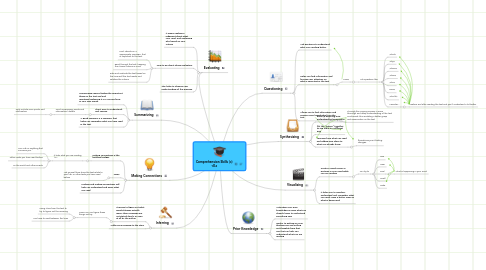
1. Inferring
1.1. It means to figure out what words/phrases actually mean; their meanings are not stated clearly or even at all by the author
1.1.1. How? You can figure these things out by:
1.1.1.1. Using clues from the text to try to figure out the meaning
1.1.1.2. You have to read between the lines
1.2. Adds more meaning to the story
2. Evaluating
2.1. It means making a judgment about what your read, and explaining why based on your criteria
2.2. How to go about doing evaluation
2.2.1. First, decide on a appropriate CRITERIA that is important to the text.
2.2.2. Read through the text, keeping the chosen criteria in mind
2.2.3. Rate and evaluate the text based on the how well the text meets and satisfies the criteria
2.3. This helps to deepen your understanding of the passage
3. Making Connections
3.1. Making connections is like building bridges
3.1.1. It links what you are reading to :
3.1.1.1. Your Life or anything that concerns you
3.1.1.2. Other Texts you have read before
3.1.1.3. To the world and other events
3.2. How?
3.2.1. Ask yourself how does the text relate to your life, or other texts you have read before
3.3. Looking and making connections will help you understand and enjoy what you read
4. Summarizing
4.1. Summarizing means finding the important things in the text and and rewriting/explaining it in a concise form, in your own words
4.2. Short, easy to understand, and concise
4.2.1. Omit unnecessary words and information/ details
4.2.1.1. Only include main points and information
4.3. A good summary is a summary that helps you remember what you have read in the text
5. Prior Knowledge
5.1. Activating your prior knowledge is using what you already know to understand something new
5.2. Similar to putting on your thinking cap and pulling out thoughts from that cap that can help you understand what you are reading
6. Synthesizing
6.1. Ends up acquiring new understanding/perspective
6.2. Put the "pieces" together to see them in a different way
6.3. Learning from what you read and adding new ideas to what you already know
6.3.1. Sometimes your thinking changes.
7. Visualizing
7.1. Create a visual movie or pictures in your mind while you are reading
7.1.1. You try to
7.1.1.1. See
7.1.1.2. Hear
7.1.1.3. Feel
7.1.1.3.1. What is happening in your mind
7.1.1.4. Smell
7.1.1.5. Taste
7.2. It helps you to visualise, understand and remember what you read; Have a better view on what is being read
8. Questioning
8.1. Ask questions to understand what your reading better
8.2. Helps you find information and focuses your attention on what's important in the text
8.2.1. How?
8.2.1.1. Ask questions like:
8.2.1.1.1. What?
8.2.1.1.2. Why?
8.2.1.1.3. Where?
8.2.1.1.4. When?
8.2.1.1.5. Who?
8.2.1.1.6. How?
8.2.1.1.7. What if?
8.2.1.1.8. I wonder...
8.3. Allows you to find information and acquire more knowledge from the text
8.3.1. Through this inquiry process, a more thorough and deep understanding of the text is achieved, thus enabling a better grasp and examination on the text
